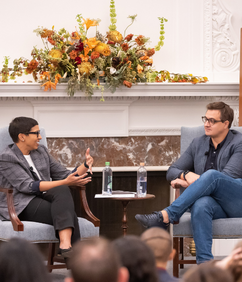In an NYU Law Forum, Melissa Murray and Chris Hayes consider the aftermath of the Dobbs decision
On November 2, MSNBC’s “All In” host Chris Hayes joined Frederick I. and Grace Stokes Professor of Law Melissa Murray for a conversation about the future of abortion, privacy rights, and equality in the United States following the Supreme Court ruling in Dobbs v. Jackson Women’s Health Organization that last June eliminated federal protections of abortion. The discussion took placed during an NYU Law Forum, sponsored by Latham & Watkins and co-hosted by the Birnbaum Women’s Leadership Network.
After offering a brief history of protection for abortion rights under the 14th Amendment, Murray and Hayes discussed the Dobbs decision’s threats to substantive due process, a principle that the Fifth and 14th Amendments protect certain fundamental rights, even if unenumerated, and stare decisis, the doctrine that courts will follow precedent. The speakers focused on the importance of precedent in constitutional law and the rights that are potentially put at risk by Dobbs, including the rights to contraception and same-sex intimacy and marriage.
Watch the full discussion on video:
Selected quotes from the discussion:
Melissa Murray: “The 14th Amendment was meant to eradicate all of the vestigial aspects of slavery and to make a distinction between what citizenship for free people was versus what enslavement was. [The drafters] looked at enslavement and asked what its characteristics are. Well, you definitely have no control over your own body, you could not control your own labor, you are often forced to bear children to expand the wealth of your master, you had no control over your children—they could be sent or sold away from you—and you could not enter into a civil marriage. When they talked about liberty in the 14th Amendment, the drafters explicitly understood liberty in opposition to all of these conditions of enslavement. To say that there is no textual rooting for a right to bodily autonomy is to completely ignore this history and the circumstances under which the 14th Amendment was debated, drafted, and ultimately ratified.” (video, 10:30)
Chris Hayes: “The moral cosmology that produces an opposition to abortion…is that it is murder. And so it’s just not going to be the case that the law will say, ‘Well, it’s fine that there is child murder happening in California.’… Clearly, Amy Coney Barrett believes that it is murder, and clearly is not going to be fine with ‘systematic child murder’ happening in 20 of the 50 states. It is obviously an untenable moral situation if that is your first, principal commitment— which it is, genuinely, for millions of Americans, including people on the Supreme Court, including people who are serving in public office.” (video, 39:04)
Hayes: “There are three issues stacked atop Dobbs. There is the actual future of abortion rights. Atop that, there is a methodological question about our compliance with, to use Justice Samuel Alito’s phrase, the ‘nation’s history and traditions.’ And above both of these questions sits the question of precedent—questions about how much precedent holds, what the standard is for overturning precedent, and whether precedent actually means anything in any meaningful sense.” (video, 43:17)
Murray: “What I respect about Roe is that we have oriented our lives around the availability of it. And what troubles me about this sort of ‘stare decisis is for suckers’ moment that the Supreme Court seems to be engaged in is that we cannot predict where this goes unless we think about the ideological underpinnings of the Court and its personnel…. The rooting principle of the Anglo-American legal tradition is this idea of incremental change over time, distinguishing cases on the fact, not on the basis of who is on the Court or who is making the decision. This skepticism of precedence and the sort of fast and loose interest in stare decisis completely undermines all of that. It undermines predictability.” (video, 49:47)
Posted on December 21, 2022


